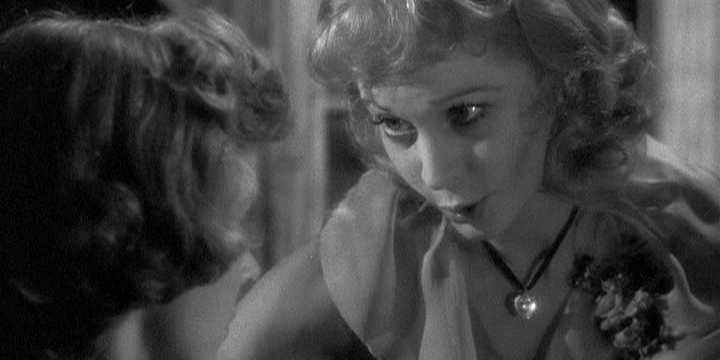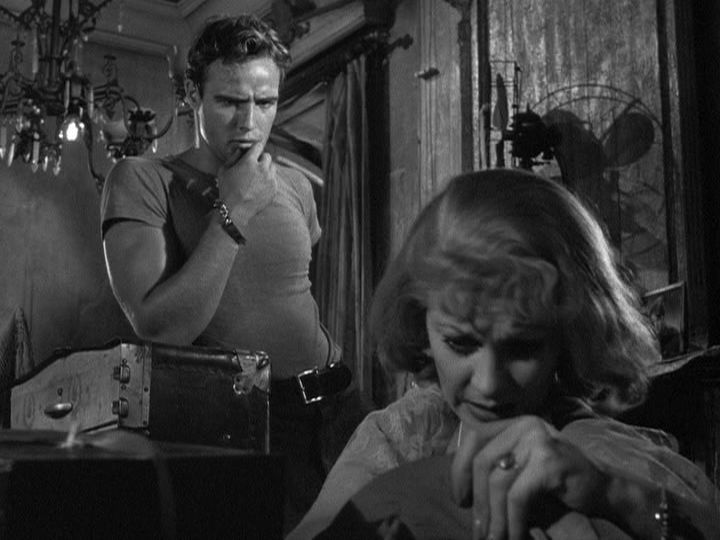My Best Shot: A Streetcar Named Desire
I’ve tried. I swear I’ve tried. But after numerous repeated viewings, I still look upon Vivien Leigh’s Blache DuBois in A Streetcar Named Desire and wonder what gains the feisty, ever resourceful Scarlett O’Hara thinks she’ll get out of posturing so self-consciously and pitching her voice around the range of a twittery coo. It’s a testament to Leigh’s legendary performance as that other Southern belle in Gone with the Wind that it haunts this role too. Yet Leigh is so much more stiffly heightened here, even while keeping within a similar vein of theatricality, that we can’t quite say she’s approaching Blanche as an aged, more destitute remainder of who Scarlett once was either (though now that I would’ve liked to see).
Now, I know a good number of critics whom I admire are fond of how Leigh’s Blanche so clearly knows she doesn’t hold up to the light. And I grant that her overt, somewhat off-putting theatricality does give credence to her antagonist Stanley Kowalski, whom Marlon Brando embodies with slurred, masculine brutishness without turning himself over to a Raging Bull-esque caricature of ego-bruised paranoia. Brando’s Stanley is astute enough to catch just how much flirtation is going into a request for a cigarette, or how much disdain is intended by his wife’s curt naggings about being a pig at the dinner table. This version of A Streetcar Named Desire thus retains a thrilling charge, as we take to Stanley’s clear-eyed grasp of how Blanche’s presence truly encroaches on his marriage and poker-night fiefdom, even as we grow horrified at the lengths to which his inability to stomach Blanche will eventually go.
Failed oppositions
But much as A Streetcar Named Desire enthralls us through these shifting allegiances, I still would have liked for the movie and actress both to have more thoroughly sold me on Blanche’s fantasies and frailties. As written, Tennessee Williams’ masterpiece richly evokes the dialectic between two ways of ekeing out space for oneself, in a life that doesn’t ever serve things up the way you want them. Between a hardbitten refusal of sham, and a wholehearted embrace of romantic fantasies. Between a resolve to assume the worst in people, and a dependence on the kindness of strangers.
It hence feels like a lapse on this dialectic, if not outright treachery, that the movie doesn’t animate itself when Blanche breaks out into a twirl amidst radio jazz and a lantern’s glow; the camera stays cruelly rooted as she dances herself in delusion, just before Stanley charges in to hurl the radio out of a window. Likewise, in the movie’s most overt statement of purpose, Leigh bulges her eyes and hardens her voice as she makes her Norma Desmond-ish pronouncement that “Deliberate cruelty is not forgivable.” What are the gains from burlesquing Blanche in this way? Perhaps one might find the tragedy in her patent self-deceit, but it feels like the kind that forces us into a chilly remove—especially since Williams has stripped her of a moody Gothic estate to help her along, and as noted, director Elia Kazan leaves her to fend for herself amid the grimly realist mise-en-scène.
At best, I can countenance Leigh as fearlessly tamping yet another angle to the dialectic, battling Brando’s gut-tethered Method approach with her own clinical, estranging Brechtian affect. But we know who won this war. We are all Brando’s children, and much as I appreciate the difficulty of Leigh’s work, the drive to accept an actor as fitting naturally into her mise-en-scène makes this Blanche a hurdle I have yet to cross. The most fascinating moment in this movie, for me, is hence reflected in my pick for best shot above. Stanley, who has not long ago burst his top at Blanche’s phoniness, watches as Blanche molts an unvarnished flare of emotion at a dead lover’s letters. Blanche, for her part, will soon shift into a posture of businesslike calm to meet Stanley’s invocation of the Napoleonic Code. Watch as they arrive at some odd understanding, if only for just a while.
A Streetcar Named Desire | 1951 | USA | Director: Elia Kazan | Screenplay: Oscar Saul, Tennessee Williams | Cast: Vivien Leigh, Marlon Brando, Kim Hunter, Karl Malden



